The Book of the Gloucester Fishermen 1928 Hand Signed By James B. Connelly
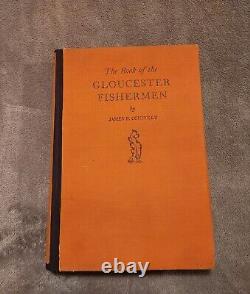
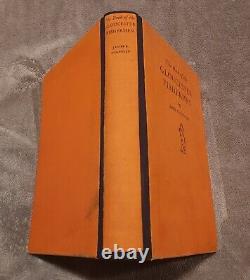
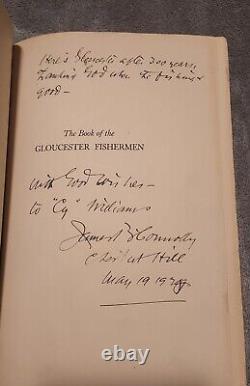
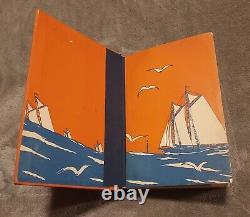
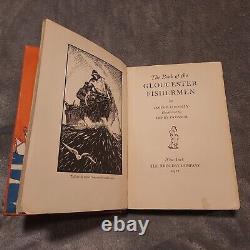
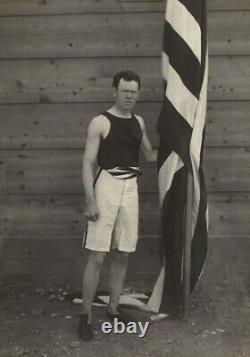

The Book of the Gloucester Fisherman, Rare, Hand-Signed in 1927 by Author James B. The Book of the Gloucester Fisherman, by James B. Connelly, NewYork: The John Day Company, 1927. This is a rare, vintage hardcover, firstedition. Many beautiful hand drawn illustrations by Henry O'Connor with publisher'sorange cloth covers.
Excellent binding appears that it may have been re-bound bya professional because both front and back covers are in very good condition, and considering this book is only 2 years shy of being 100 years old, the pagesare in good condition with a minimum of light spotting, (no dust wrapper). Whatmakes this vintage book an extremely rare find is that it contains a very clearpersonal note in the overleaf, that was hand written by its' author James B. Connelly, to a person named, "Cy Williams", signed and dated, 1927. Connelly was a world class author and athleteand had celebrity status and was personal friends with famous sports figuressuch as Gene Tunney & many other high profile famous sports figures.Thisleads me to believe that this book was a gift from James Connelly, and the notein the overleaf may have been written to one of two professional athletes that werenamed Cy Williams, that James B. Connelly may have known, and been associatedwith during his life. One was a famous and accomplished professional baseballplayer, and one, a famous professional football player.
Williams made his debut with the Cubs on July 18, 1912 atthe age of 24, and from 1915 to 1927 he was a consistent power hitting centerfielder who led the National League in home runs 4 times during his career. (See " Fredrick Cy Williams" attached picture). Burton Caswell "Cy Williams", was an Americancollege and professional football player who was a tackle for three differentprofessional teams in the American and National Football League during the1920s and early 30's.
In 1926, he played professionally for the NewarkBears of the American Football League, appearing in all 5 games played by theBears. During the 1929 and 1930 NFL seasons, Cy Williams played tackle for theStaten Island Stapletons as a starter for 21 regular season games. Was a giftedAmerican athlete and author. Connolly was born to poor Irish immigrants from the Aran Islands, fisherman John Connolly and Ann O'Donnell, as one of 12 children, in SouthBoston, Massachusetts. Growing up at a time when the parks and playgroundmovement in Boston were non-existant, Connolly joined other boys in the streetsand vacant lots to run, jump, and play baseball and football.
He was educated at Notre Dame Academy and then at the Mather andLawrence grammar school, but never went to high school. In 1891 he called aspecial meeting of the Catholic Library Association of Savannah and wasinstrumental in forming a football team. Soon thereafter, Connolly was electedcaptain of the CLA Cycling Club and aggressively sought to promote the sport onbehalf of the Savannah Wheelmen. Dissatisfied with his future, Connolly regained his lost school yearswith study.
In October 1895, he took the entrance examination to LawrenceScientific School and was accepted to Harvard University. After thecreation of the International Olympic Committee in 1894 the first modernedition of the Olympic Games were scheduled for April 6 to 15, 1896 in Athens. Connolly decided to participate, and submitted a requestfor a leave of absence to the Chairman of the Harvard University Committee onthe Regulation of Athletic Sports and was denied. According to Connollyhimself, he was informed that his only course of action would be to resign andmake a reapplication to the college. Connolly then claimed to have replied: Iam not resigning and I'm not making application to re-enter. I'm gettingthrough with Harvard right now. It is unclear whether this happened.Harvard records do show a request by Connolly for a leave of absence to Europe, which was denied. Connolly then requested an honorable withdrawal as a student, which was granted on March 19, 1896.
Representing the Suffolk Athletic Club, which paid for most ofConnolly's expenses (Connolly later claimed he paid it all himself), he leftfor Greece on a German freighter, the Barbarossa, along with most of the restof the first American Olympic team. After arriving in Naples, Italy he wasrobbed and almost lost his ticket to Athens. He managed to retrieve it onlyafter a pursuit against the robber. Finally he took the train to Athens, arriving there just in time for the Games.
The first final on the opening day was the triple jump (known asthe hop, skip and jump), in which Connolly competed. Connolly's style, takingtwo hops with the right foot, is no longer allowed in this event, but wasacceptable in 1896. With this style, he outjumped the field, finishing morethan one meter ahead of his nearest opponent by jumping 45 ft 0 in, earning himthe 1st silver medal (gold medals did not yet exist). His win made him the 1stOlympic champion since 385 AD, when Athenian Zopyrus won the pankration, othersources name Armenian Varasdates, who won boxing in 369. He took 2cnd place in the high jump, 5 ft 5 in, tying with RobertGarrett behind Ellery Clark, and 3rd place in the long jump, 19 ft 2 in. Connolly was welcomed back in Boston and presented a gold watch by citizens. Healso competed at the 1906 Olympics in the Triple and Long Jump and competed inthe 2cnd edition of the Olympics, held in Paris, but failed to retain his titlein the triple jump, losing to compatriot Meyer Prinstein. Connelly attended the 1904 SummerOlympics as a journalist and published accounts of the Spanish-American War inthe Boston Globe as Letters from the Front in Cuba where he served in the Irish9th Infantry of Massachusetts. Connelly spent years on different vessels, fishing boats, militaryships all over the world, and was an authority on maritime writing.Hepublished more than 200 short stories, and 25 novels. He twice ran for Congressof the United States on the Progressive Party Ticket, but was never elected. He was a member of the National Institute of Arts andLetters.
Connolly died in New York City at the age of 88. A collection of itemsrelated to Connolly, including his triple jump silver medal, is in the libraryof Colby College in Maine. Connolly was a crew member of thevictorious schooner Esperanto in 1920, the 1st International Fishing SchoonerChampionship Races in Halifax, Nova Scotia. He wrote of this in Collier'sWeekly on Dec. 25, 1920 and in The Book of the Gloucester Fishermen, publishedin 1927.Which included a 2-page typedletter, and a newspaper clipping. The letters were not dated, their associationto the book suggested they were from 1927.
The letter was addressed to boxingchampion Gene Tunney from J. Holmes, stating the book was signedby its' author, but James B. Connolly did not sign it or the letter.
Good LuckBidding on this authentic Rare Vintage Book in which I will include FREESHIPPING.
